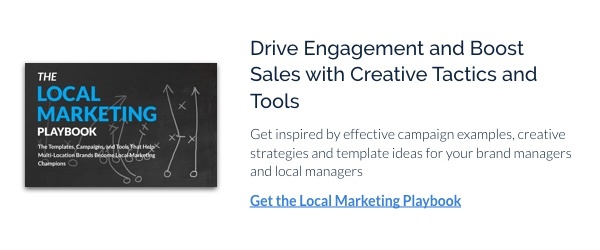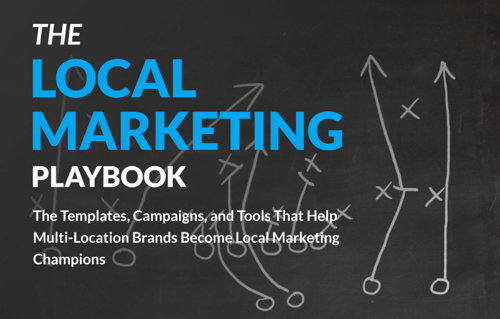For any enterprise brand, driving local brand compliance is an integral component of the brand's local marketing strategy. In order to attract customers and retain them for the long haul, a local affiliate's marketing communications have to feel like those of the parent brand.
Why? Customers expect brands to provide and honor the same offers, discounts, incentives and other marketing communications from one location to the next. If local marketing isn't compliant, brand consistency declines. If brand consistency declines, brand equity declines. If brand equity declines, then the brand loses customer loyalty and revenue. This is a slippery slope that enterprise brands must avoid.
What is Marketing Compliance?
Marketing compliance means that everyone who touches marketing plays by the same rules. If there's a rule from the lawyers, they follow it. If there's a rule from the designers, they follow it. If there's a rule from the CMO they follow it. At headquarters, getting compliance down-pat isn't that difficult because everyone's usually in the same room (or just down the hall) and they all do marketing for a living.
But getting brand compliance at the local level is much harder. Local marketing compliance happens when local affiliates like franchisees play by the same marketing rules as everyone else and they properly deliver brand messaging, campaigns and offers.
When local affiliates are on-the-ball with these offers and promotions, it leads to better or more consistent results. This has a direct impact on revenue, because there’s a consistent customer experience from one location to the next. Consumers know what to expect from the brand and understand its values more clearly, which means they're more likely to buy its products or services.
However, a lot of local marketers don't know how to stay in compliance with their marketing. They've never been taught how, and even when they're told what to do they haven't got the time to figure out how exactly they can get it done. When franchisees don’t comply with brand guidelines or create their own promotions without getting the right legal disclosures, the whole brand suffers. When they go rogue and start running ads that are cobbled together without any oversight, the only possible outcome is a big fat local marketing problem.
So what's really at stake if the brand and local affiliates become misaligned?
Risks of Non-Compliant Local Marketing
#1: Loss of Customer Trust
For many of the world's most successful distributed brands, improving customer experience is a major point of focus nowadays. According to a recent report, 70% of CMOs think brand consistency is a top three challenge to delivering a great customer experience across corporate and local marketing activities.
Consistency is critical for any brand, but it's especially important for distributed organizations. Because these brands are dependent on their many locations for serving customers well, the potential for an issue at one location to blow up into a bigger problem is considerable.
If customers have a bad experience at that store, they lose trust in the rest of the chain. Similarly, if the marketing message at one store is different from what another store is advertising, customers quickly lose faith in the brand's sincerity. Once that trust is lost, it can take a long time (and a lot of marketing dollars) to try and rehabilitate it.
Here are the biggest factors that contribute to non-compliant marketing and the loss of customer trust:
- Misalignment on brand standards. There can often be a disconnect at the local level about what's required to make a good marketing piece. Unlike marketers at HQ who think that the brand bible is the be-all end-all when it comes to style and tone, local marketers are less concerned with what's the ideal way to get their message across and more worried about getting it out there in the first place. This leads to local ads that are just slightly off and can actually confuse customers about what the brand is or stands for.
- An inconsistent customer experience. When local affiliates aren't delivering a consistent customer experience from one store to another, brands risk losing their customers' trust in the network. The experience a customer has at one franchise should closely mirror the experience they had at another. If it doesn't, customers are getting mixed messages and will hurt long-term loyalty.
#2: Missed Revenue Targets
Now more than ever, brand managers are responsible for helping the whole organization hit its revenue benchmarks. When affiliates aren't bought into being compliant with their local marketing this task gets much harder. Why? Reliable marketing performance depends on being able to constantly reach your audience with the right message for your brand. Brands that can do that drive results. Local marketers who want a quick fix to their revenue problems will look for ways to get around that compliance framework because they think it's in their way. But effective brand managers know that if the franchisees or dealers stick to the game plan and don't go off-script, they're more than likely to hit their objectives.
One of the most important things to understand about your local affiliates is that they’re not marketing gurus. Although they often have a deep understanding of what their customers care about, and the products they’re selling, they typically do not come from a marketing background. When it comes to having patience and trusting in the marketing system the brand has set up, you'll often find skepticism at the store level. So to help set franchisees up for success, they need:
- Empathetic regional marketing teams. Not only do regional marketing teams need to be proactive and involved with their assigned locations week-to-week, they need to be empathetic. It’s important for these teams to truly understand the way that franchisees or store managers are setting their goals and what's motivating them to be compliant (or be not-so compliant).
- Access to discounts or promotions. If franchisees don't have the ability to push the panic button when they see the quarterly numbers starting to flatline, they'll either neglect the brand's campaigns or deliberately go around the system to get what they think they need. Give your local affiliates the chance to pull of a quick BOGO or other promotion that they can use to jumpstart slow sales and get their mojo back. Most importantly, make it possible for them to run those offers in marketing materials that are right on-point with brand guidelines.
- A local marketing performance tool. If your affiliates are skeptical of the impact that consistent marketing performance has on the top-line numbers, show them the evidence. Using a tool that lets you compare marketing outputs with store-level revenue is a perfect way to make the case to your franchise network that getting on board with the brand's campaigns has a direct impact on how their sales numbers look.
#3: Executive Pushback
If a brand is seeing missed revenue targets and low-performing campaigns because of inconsistent local marketing, you can bet that senior management will be wondering why things aren't being carried out properly.
While you might expect the brunt of this to fall on the regional or field marketing team who are responsible for helping to maintain success of the store network, it can actually show up for just about everyone in the marketing department, regardless of how often they speak to the field. It shows up when the CMO pauses a meeting to ask why the print ad in his local town paper looks so bad. Or when reporters go looking for marketing fails and suddenly your brand is in the headline.
Marketers and field marketing teams can take proactive steps to avoid these uncomfortable spots by communicating better with the affiliates what expectations management has about the quality of marketing. Take advantage of the relationships you have at the local level by doing things such as:
- Let regional teams take the lead. Franchisees and other affiliates are influenced by what they hear from their regional marketing teams since they interact with them so frequently. These teams should take ownership over marketing compliance errors, and provide constructive feedback to the affiliates whenever they can about what needs to be fixed.
- Get ahead of the problem. Regional marketing teams can also get ahead of compliance issues many times. By providing the correct training on how to maintain marketing compliance, franchisees go into the marketing process with a better idea of what not to do. If the CMO or another executive asks why compliance with marketing standards has gotten so much better, point to that proactive approach as a major piece of it.
- Track everything. By utilizing a tool that keeps track of marketing collateral and branding, everyone from C-level on down has the proof about how closely the local affiliates are following guidelines.
#4: Costly Legal Issues
In the case that local marketers use non-compliant assets in a campaign, there can be serious consequences. Marketing collateral that's off-brand often goes beyond just using the wrong colors, fonts and aesthetics. The FTC is constantly bringing new cases against firms that are accused of deceptive or improper advertising practices. In many high-profile cases, these result in settlements worth millions.
While most local marketers are well-intentioned in their efforts to use marketing materials, they don't always check on the legal ramifications of what they're trying to do before they jump in. Some of the costly legal issues that stem from non-compliant marketing include:
- Rights Management Infringement: Large organizations such as Shutterstock and Getty Images have the tools to find out where their images have been used online. Using an unlicensed photo can have serious implications – for the brand and the local marketer. The issues can compound as well, especially if the image in question has been circulating among the local stores or is being used across different marketing materials. Everywhere it's used could be a new, unique infraction, not to mention all those ads will have to be replaced. Needless to say, content producers are fierce defenders of those rights management rules and aren't afraid to bring issues to a lawsuit.
- Intellectual Property Infringement: Beyond the photography example, there are all kinds of other legal ramifications that relate to intellectual property which local stores/franchises need to be prepared for. For instance, in the summer of May 2017, Starbucks released a Unicorn Frappuccino. However, a Brooklyn cafe had been selling what they called Unicorn Lattes nearly a year before that. It resulted in a lawsuit where the cafe claimed Starbucks had stolen their intellectual property. Without the proper resources or knowledge on how to avoid these kind of scenarios, franchises need to trust the parent brand to do their due diligence about creative property.
- Fraud and Deception: The Federal Trade Commission enforces truth-in-advertising laws to protect consumers from deception and fraud. When consumers interact with an advertisement they expect the advertisement to be "truthful, not misleading, and when appropriate, backed by scientific evidence".
Marketing Compliance Made Easy
What's at stake if local marketers fail to comply with corporate marketing activity? Non-compliant local marketing will lead to loss of customer trust, missed revenue targets, executive pushback, and worse, costly legal issues. At the corporate level, building a marketing campaign requires valuable time, energy, and capital. There's nothing worse then building a marketing campaign that falls short locally.
The most effective distributed brands don't leave marketing compliance to chance. Industry-leading corporate brands understand the real power of brand consistency, field feedback from local marketers, and equip them with Local Marketing Automation (LMA) tools to make compliance easy.
Recent estimates indicate that 74 % of CMOs will invest in SaaS marketing technologies within the next 12-18 months. Why? With ready-access to easy-to-use templates and more, local marketers can deliver marketing material that aligns with the corporate marketing plan.
Interested in learning more about the power of LMA? Download The Local Marketing Playbook. 




